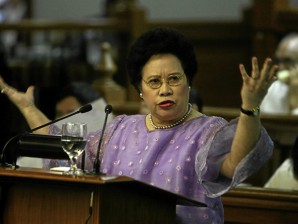The chairperson of the Senate committee on constitutional amendments said convening Congress into a bicameral constituent assembly is the wrong way to bring about Charter change (Cha-cha).
“With respect to the procedure, it is so wrong. It is dead wrong. I’m sure that if it were brought up to the Supreme Court even only as a hypothetical question, it would easily be rejected,” Senator Miriam Santiago, a former judge and law professor, warned in an ambush interview.
Senator Franklin Drilon, a stalwart of the dominant Liberal Party, proposed the bicameral constituent assembly apparently as a compromise that would allow senators and congressmen to vote separately on proposed amendments to the Constitution. It was approved in principle by leaders of Congress.
Earlier proposals to convene Congress into a constituent assembly, voting as a whole, had been thumbed down by senators, who would be outnumbered by members of the House of Representatives.
Drilon’s idea is for the two chambers to vote separately on specific amendments contained in resolutions. A three-fourths vote of each chamber would be required to pass a resolution.
Mere procedure
Senate leaders present during the legislative summit last month assured that amendments would be limited to economic provisions, specifically those that will usher a more favorable business climate for foreign investors.
“I am sorry to dash cold water on all those fervent hopes about inviting investments, but the truth of the matter is it does not take a constitutional amendment to invite foreign investors… It is certainty and stability,” Santiago asserted.
“Any businessman will tell you that what would invite investments… is not whether we allow them to own the enterprise or limit them only to 40 percent ownership,” she added.
Santiago also warned that since the Constitution was considered higher than ordinary law, “how can you amend the highest law of the land by a mere procedure reserved for ordinary bills? There should be a higher level of sovereignty involved.”
Senate leaders later dismissed Santiago’s posturing saying they are prepared to elevate the matter to the Supreme Court if necessary.
“We believe the (proposed bicameral constituent assembly) can be supported by the present Charter provisions,” Drilon said in a separate interview.
“At the end of the day, it will be the Supreme Court who will decide as to whether or not this fourth mode would be a valid way of amending the Constitution. While we respect Senator Santiago’s opinion, we have our own opinion and at the end of the day it will be the Supreme Court who will decide which of the two opinions are valid,” he added.
Senate President Juan Ponce Enrile made a bolder pronouncement. “I am not as bright as (Santiago) is but when she takes it up with the Supreme Court, I think she will lose… She should read the Constitution again,” he said.
False hopes
Senate Minority Leader Alan Peter Cayetano urged his colleagues to stop giving people “false hopes” by packaging Charter change as the ultimate solution to major problems.
“The problems of our country are peace and order, graft and corruption, the burgeoning prices of oil and electricity and the lack of infrastructure. Ask the potential investors in our country and they’ll mention the same problems hampering our economic growth,” Cayetano noted.
Forcing amendments at this point could “only create bigger problems,” he also warned.
“Bringing the people’s attention to Charter change and making them believe that it will solve all of the country’s problems, especially concerning the economy, is really just giving them false hopes,” he said.
Economic advisers
Cayetano also called on the economic advisers of the President to be more open in engaging the people to debates regarding the country’s economic policies in order to further articulate their plans well.


